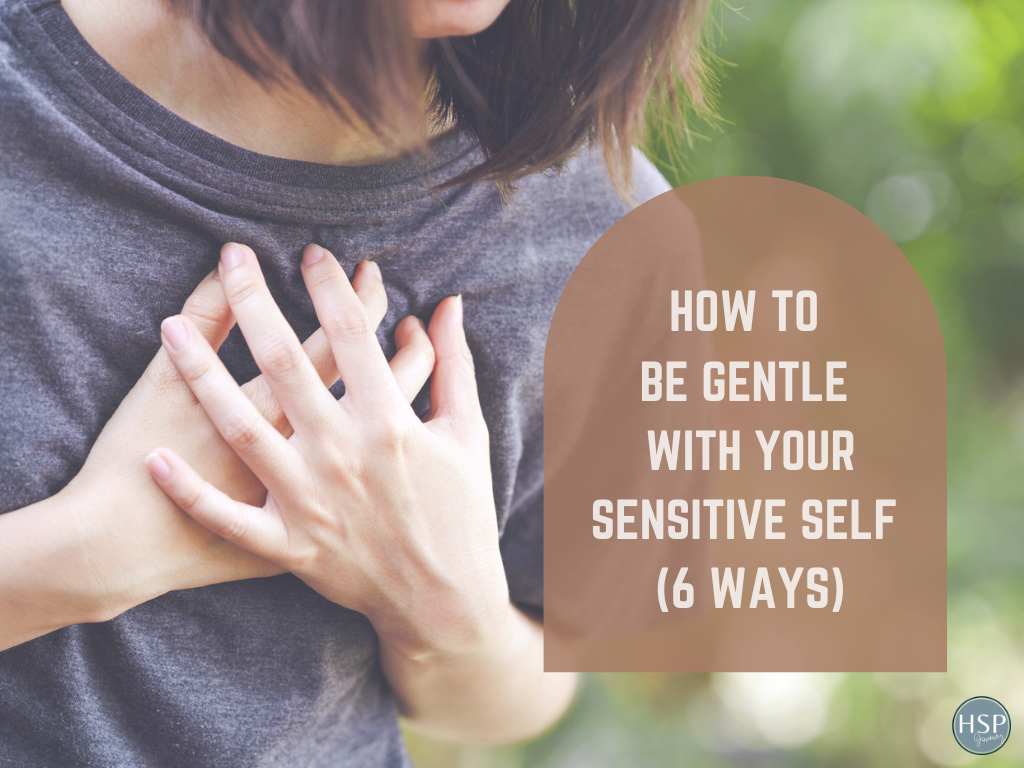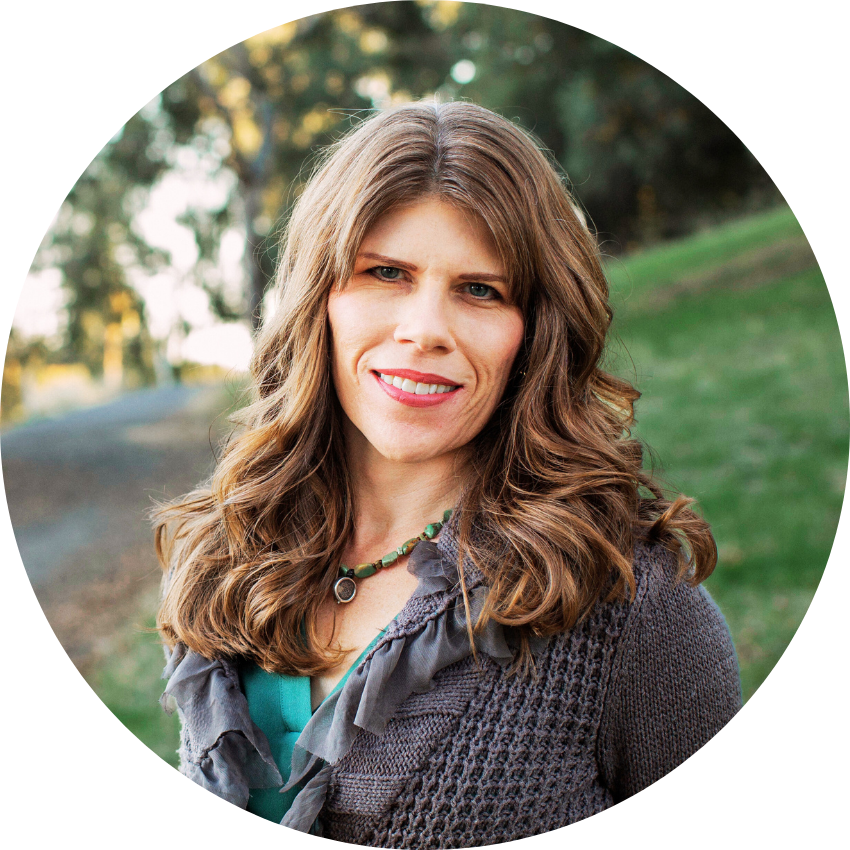During difficult seasons, health crises, or chronic illness flare ups, it can be essential to be gentle with your sensitive self. What does this mean, you might be asking yourself? It means taking a detour from your regularly scheduled activity level, ramping up your self-care, ramping down your to-do list, and going to great lengths to preserve your physical energy and mental well-being. We know that highly sensitive persons (HSPs) are more prone to chronic ailments and somatic anxiety, so no matter what, learning how to be gentle with your sensitive self is a critical step in preserving your physical and mental state.

Table of Contents
#1 – Know Your Limits – to Be Gentle with your Sensitive Self
It might sound elementary to some, but knowing your limits is important–especially when you’re going through a difficult time. Depending on your activity level, it can help to review your calendar or daily task list with a close friend or family member. Once you have spoken or written what your normal life looks like, think through what you can reasonably handle given your circumstances. Once you’ve set some NEW limits for yourself, be careful not to push past your exhaustion limits. When having surgery recently, I was told not to pick up more than 10 pounds for four weeks. This is an example of a very clear limit.
Here are two examples:
- Notice when you’re starting to feel tired and sit down, lie down, or take a five minute eyes ‘closed’ break sitting down.
- If you’re recovering from surgery or chronic illness, allot yourself a defined amount of time to work at your computer and stop when you reach your limit.
#2 – Ask Yourself, “What do I Need Right Now?” – to Be Gentle with your Sensitive Self
If you’ve spent any amount of time working through pain, exhaustion, or not getting what you needed as a child, chances are you need to make an hourly practice of asking yourself, “what do I need right now?” Those of us with childhood trauma find that this is an essential self-care tactic to rely on daily. The aim isn’t to be selfish or self-focused, but rather to listen to oneself in order to meet your basic needs. Using the HALT protocol is helpful: “Am I hungry?” “Am I angry about something?” “Am I lonely?” “Am I tired at present?” Give yourself time to listen to what comes up. Sometimes the solution is a quick stretching break, small snack, power nap, or brief text or phone call to a friend to check in.
Here are two examples:
- Go through the HALT protocol to ask yourself what you need: Hungry? Angry? Lonely? Tired?
- Eat a snack, journal about your anger, call a friend, or take a nap.
#3 – Feed Yourself – to Be Gentle with your Sensitive Self
With health in mind, perhaps you are craving foods that will soothe you during this difficult time. Chicken noodle soup and Saltines can cure more than the common cold! Aim not to give into cravings to eat too much junk, alcohol, or other foods that can easily become coping mechanisms, but ask what your body needs. Have I had enough protein today? Do I need water? Do I need fruit? Do I need vegetables? Do I need soup? Salty or sweet? If you can’t step back from work or family responsibilities during this difficult season, perhaps consider small rewards for yourself.
Here are a few examples:
- Purchase your favorite dark chocolate (I like these individually packaged treats).
- Purchase yummy teas (Mango Ginger is my fav) or organic, compostable coffee pods that you allow yourself free reign to partake.
- Buy a ready-made salad kit or pre-cut stir fry veggies to make dinner easier.
#4 – Say “No” to Requests – to Be Gentle with your Sensitive Self
Saying “no” when family, friends, or colleagues ask you for something is HARD to do. No, I can’t drive you to the mall.” “No, I can’t make it to the party.” “No, I don’t want to be intimate tonight.” Being able to say “no” means having boundaries. It means caring for yourself so much that you will not bend yourself when you’re in a difficult season. If you’re new to boundaries, I invite you to read our article here that offers additional insights into saying “no.”
Here are ways to say “no” during difficult seasons:
- “I would love to help out, but am going through a difficult season. Can I help the next time around?”
- “I’m sorry, sweetie, but I can’t pick you up that late. I need to be in bed by 9pm. Can you ask a friend for a ride?”
- “I can’t take on that additional project right now, could I assist you next month?”
FREE MASTERCLASS:
Sensory Overload &
The Highly Sensitive Person
#5 – Silence the Voice that Says, “You’re Not Doing Enough” – to Be Gentle with your Sensitive Self
I don’t know about you, but when I’m recovering from surgery or having a fibromyalgia flare up, I start feeling bad about myself and the amount of work I can accomplish. That perfectionistic, worker bee mentality that keeps me striving does not do me any favors when I need to be gentle with myself. It’s important to get better at talking to ourselves as though we are talking to our beloved inner child. Flip the switch! That is, flip the switch that takes you from self-judgement to extra self-care, extra attention, extra TLC, and extra understanding.
Here are two examples:
- Say to yourself: “This is a unique time. I am the best person to take care of me, and I love myself the most. I will listen, hear, and be gentle with myself.”
- Say to yourself: “This is the time for reduced expectations and ease. Take it easy! Put your feet up. It’s okay. In the future you can get back after it, but right now, take extra care with you.”

Looking for an HSP-Trained coach to help you align your life with your priorities?
Through my Highly Sensitive Person (HSP) certification with the Nickerson Institute, as well as being an HSP, I offer HSP coaching to develop specific goals around your HSP needs. We HSPs frequently deal with anxiety and overstimulated nervous systems that prevent us from achieving peace and attaining our life goals. HSP coaching with me includes a detailed review of your sensitivities and a mutually-desired plan for growth and management of this superpower to shift negativity and begin seeing yourself as the hero of your own story. (Affordable monthly coaching begins at $150/month.)
#6 – Do What’s Easiest – to Be Gentle with your Sensitive Self
Many times in my own life, I aim to serve my family and my business well. Sometimes, to my own detriment. When I know I’ve spent my resources and don’t have my typical energy, I remind myself to “do what’s easiest.” Not to do the hardest thing – make the homemade dinner, keep the house extra clean, post on social media daily — NO. I said to do what’s easiest. Why is this so hard to accomplish?
As a recovering overachiever and perfectionist, I remind myself that people will continue to love me whether I make homemade bread or not. When you’re recovering from a medica procedure, “do what’s easiest.” When you’re exhausted from work and can’t clean the house, “do what’s easiest.” Sometimes this means we hire someone or ask someone to do the work for us, other times, we give ourselves grace to let things slide.
Here are two examples:
- Make a list of tasks or jobs you’d normally do in a normal week, then, create an alternate “slow week” list of substitutes next to the thing you’d normally do: cut up veggies for salad>>buy a premade bag salad.
- Talk to your partner, kids, or co-workers and let them know that you’re having a tough week and will need to offload anything that isn’t essential.
When going through a loss, grief, scary medical event, or other difficulty in life, it’s normal to feel overwhelmed or engulfed by emotion on and off. Allow yourself the space to cry, as this is completely normal. When I was going through my breast cancer diagnosis, I cried ritually on my walks each morning. It started to feel like a “cleansing” each day as I tried to accept this new club I was in. During and after surgery, treatments, and setbacks, I would go through days where I’d cry on and off most of the day, then the following day, wouldn’t cry at all.
If you’re struggling with the loss of a loved one, this it time to be gentle with your sensitive self. As highly sensitive individuals, we feel the feels more than the next guy. Give yourself space to embrace the difficulty, accept where you are, and move toward healing as hope and joy return. It will come eventually when we are gentle and loving with ourselves.
Be sensitive, be free
*This post contains affiliate links and I will be compensated if you make a purchase after clicking on my links*





[…] But with careful consideration of the factors mentioned above, you’ll be on your way toward better understanding your highly sensitive nature and unlocking your true potential. Dive into the world of HSP literature and let the journey […]